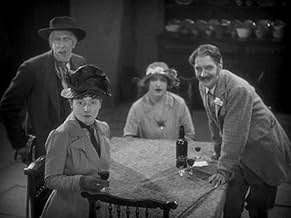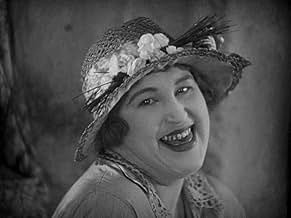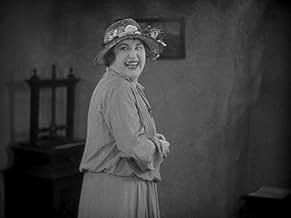CALIFICACIÓN DE IMDb
5.8/10
3.3 k
TU CALIFICACIÓN
Después de que su hija se case, un viudo de mediana edad con una granja decide volver a casarse, pero elegir una pareja adecuada es un proceso problemático.Después de que su hija se case, un viudo de mediana edad con una granja decide volver a casarse, pero elegir una pareja adecuada es un proceso problemático.Después de que su hija se case, un viudo de mediana edad con una granja decide volver a casarse, pero elegir una pareja adecuada es un proceso problemático.
- Dirección
- Guionistas
- Elenco
Lillian Hall-Davis
- Araminta Dench - Sweetland's Housekeeper
- (as Lilian Hall-Davis)
Diana Napier
- Sibley Sweetland
- (as Mollie Ellis)
Harry Terry
- Guest at Wedding Breakfast
- (sin créditos)
- …
Opiniones destacadas
Very funny. I never realized Hitchcock could do slapstick. Surprised to find the story and characters easy to follow and identify with even with the near lack of title cards. The best silent Hitchcock film I have seen and maybe the funniest film he ever made.
The first half is rather slow, but keep going - it's definitely worth it. The humour in Hitchcock's films is generally based around great character actors (e.g. Jessie Royce Landis in To Catch a Thief and North by NorthWest), and here not one of the actors disappoints. Lillian Hall Davis has a better part in the Ring (also 1928 - Gordon Harker is again very amusing in it too), but is lovely in this film. Sound would have added nothing. My 8-year old daughter was apprehensive about watching a silent film, but once things started to get going in the second half, was hooked.
Hitchcock referred to it in later years as one of his "photographed plays", but the action occurs in several locations, so is nowhere near as constrained as many of his films (plays or not). In fact, even though the location shots are few and far between, they really give this film a non-studio feel.
All of Hitchcock's films are notable for their visual storytelling (look at the initial scene-setting in Rear Window that speaks volumes without a single word being uttered), and it is interesting to see the origins of this, and the great influence of German Expressionism.
Hitchcock referred to it in later years as one of his "photographed plays", but the action occurs in several locations, so is nowhere near as constrained as many of his films (plays or not). In fact, even though the location shots are few and far between, they really give this film a non-studio feel.
All of Hitchcock's films are notable for their visual storytelling (look at the initial scene-setting in Rear Window that speaks volumes without a single word being uttered), and it is interesting to see the origins of this, and the great influence of German Expressionism.
If you loved Sir Alfred Hitchcock and his contributions and services to the film industry, you should see all of his films for study and preservation. This is one of his early silent films. If you have the patience to watch a two hour silent film, it's not that easy. We're so used to speeches and conversations that we forget to watch and see their facial reactions in the early age of cinema. This film is more comedic than dark and dramatic. While the story is more farcical, it is nice to see Hitchcock have a sense of humor since he became more known for the macabre in his films. It is not hard to believe that film audiences didn't laugh and enjoy this film in the cinema in 1928 long before the Great Depression. Still, I would watch it again if I had too. It's not a bad film. You wouldn't know Hitchcock directed it.
This early Hitchcock silent, his first for British International Pictures, is a simple romantic comedy adapted from a stage play. A far cry from crime and suspense, but at this point Hitchcock had neither the influence nor the realisation of his true forte to select his projects.
As with all but one of the Hitchcock silents, the screenplay was by Eliot Stannard. Stannard, with his typical understanding of the visual medium, dispenses with the wordiness of a direct stage-to-screen adaptation. He allows time for the characters to reveal their feelings in reaction shots and point-of-view shots, and replaces verbal gags with visual ones. The Farmer's Wife is thus as devoid of unnecessary intertitles as, say, The Manxman.
Given its rural setting, Hitchcock was more or less obliged to include some shots of rolling hillsides. Hitch doesn't seem to have liked the countryside much – in most of his later films if it appears at all it's as a functional back-projection – but he doesn't do too badly here as far as pure photographic beauty goes. Other than that the shooting style is typical of Hitchcock. There is a growing use of fluid camera movement, and we can see that Hitchcock technique, whereby the camera appears to be leading the audience, gradually revealing to us or drawing us in.
Whether it comes from Stannard's script or Hitchcock's head I don't know, but there is a massive tendency here towards point-of-view shots during dialogue scenes, in which the other speaker looks straight into camera. The majority of these are rather pointless, with the exception of several appropriately ghastly close-ups of the Farmer's bridal candidates.
To say the conclusion of The Farmer's Wife is predictable would be a grand understatement. A shortsighted person could see it coming through several miles of fog. Not a bad thing in itself, but rather than play upon its obviousness (which Stannard and Hitchcock must have been aware of), the picture simply becomes a tedious game of waiting for the inevitable. The Farmer's Wife is only quite funny, and is altogether too long.
As with all but one of the Hitchcock silents, the screenplay was by Eliot Stannard. Stannard, with his typical understanding of the visual medium, dispenses with the wordiness of a direct stage-to-screen adaptation. He allows time for the characters to reveal their feelings in reaction shots and point-of-view shots, and replaces verbal gags with visual ones. The Farmer's Wife is thus as devoid of unnecessary intertitles as, say, The Manxman.
Given its rural setting, Hitchcock was more or less obliged to include some shots of rolling hillsides. Hitch doesn't seem to have liked the countryside much – in most of his later films if it appears at all it's as a functional back-projection – but he doesn't do too badly here as far as pure photographic beauty goes. Other than that the shooting style is typical of Hitchcock. There is a growing use of fluid camera movement, and we can see that Hitchcock technique, whereby the camera appears to be leading the audience, gradually revealing to us or drawing us in.
Whether it comes from Stannard's script or Hitchcock's head I don't know, but there is a massive tendency here towards point-of-view shots during dialogue scenes, in which the other speaker looks straight into camera. The majority of these are rather pointless, with the exception of several appropriately ghastly close-ups of the Farmer's bridal candidates.
To say the conclusion of The Farmer's Wife is predictable would be a grand understatement. A shortsighted person could see it coming through several miles of fog. Not a bad thing in itself, but rather than play upon its obviousness (which Stannard and Hitchcock must have been aware of), the picture simply becomes a tedious game of waiting for the inevitable. The Farmer's Wife is only quite funny, and is altogether too long.
Slight but enjoyable early Alfred Hitchcock movie about a widower (Jameson Thomas) who sets out to find a new wife with help from his loyal housekeeper (Lillian Hall-Davis). It's a charming and touching story. Not quite what you would expect from the eventual Master of Suspense. It's a good-looking film, as well. Thomas and Davis are both likable. Gordon Harker is fun as the farmer's handyman, Churdles Ash. Love that name. It's nothing to get worked up over but a pleasant enough film that's worth a look to more than just Hitchcock completists.
¿Sabías que…?
- TriviaUnlike most of his later films, this film does not have a cameo by Sir Alfred Hitchcock.
- ErroresAfter Louisa rejects Farmer Sweetland, his horse changes position it between shots as he mounts it.
- Citas
Farmer Sweetland: ...I am a man that a little child can lead but a regiment of soldiers couldn't drive.
- ConexionesFeatured in The Skin Game (1931)
Selecciones populares
Inicia sesión para calificar y agrega a la lista de videos para obtener recomendaciones personalizadas
Detalles
Taquilla
- Total a nivel mundial
- USD 152
- Tiempo de ejecución
- 1h 40min(100 min)
- Color
- Mezcla de sonido
- Relación de aspecto
- 1.33 : 1
Contribuir a esta página
Sugiere una edición o agrega el contenido que falta


































